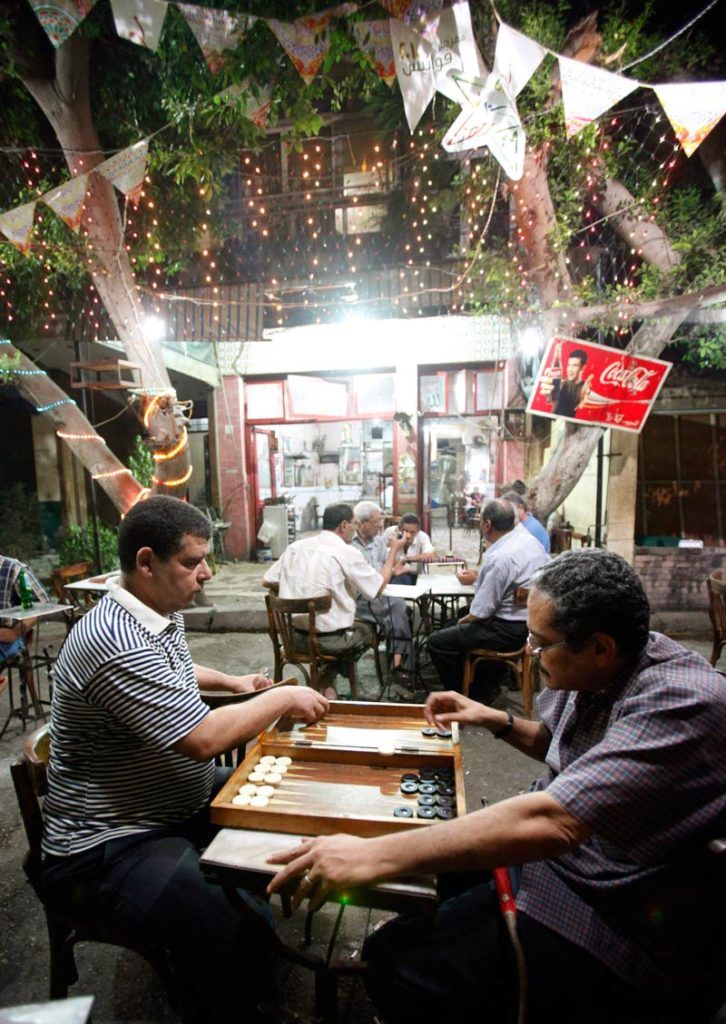On the set of Coffee Shop, a new Egyptian soap opera to be televised next month, there was a decidedly male presence. The director was male, so too the scriptwriter. The producers were also men. The lighting operator was a man, as were the sound team. Weirder still, all the actors were men. In fact, of the 30-strong cast and crew scurrying around the set, not one was a woman.
It is this that sets Coffee Shop apart from the dozens of other soaps that will be aired in Egypt throughout Ramadan, the month-long fast that is also Egypt’s busiest and most lucrative TV season. Specially commissioned multi-episode soaps have been enjoyed by families during Ramadan since the 1960s and are often associated with romantic storylines and female stars. Controversially, Coffee Shop will have neither. Its cast is male only.
“The basic aim of the series,” said Sayed Said, Coffee Shop‘s creator and chief scriptwriter, during a break in filming, “is to show that you can make a good show without depicting naked women.”
Said conceded it was possible to make good television that featured women – “as long as they’re veiled”. But he argued that even veiled women were not a necessary part of his show since Coffee Shop is set in a street café, a largely male environment in Egypt.
Each episode will centre on arguments between two cafe regulars – Amr, an Egyptian patriot, and his friend Sherif, who hankers after a western lifestyle. “Every time Amr ends up being right,” said Said, “and Sherif ends up being wrong.”
‘Different from western ideas’
Said dreamed up the concept after becoming frustrated by the sexualised content of other Ramadan series, which he believes is offensive to Egypt’s conservative population. “I’m just trying to reflect the opinions of the everyday Egyptian citizen,” he said.
“Our idea of art is very different from western ideas,” agreed director Wagdi Elarabi, rehearsing lines elsewhere on set – a real-life cafe in a semi-rural settlement just west of Cairo. “In Europe, Parliaments agree that boys can marry boys. But [here] that is forbidden.”

Coffee Shop will be broadcast on al-Hafez, a new channel that caters for Salafists – ultra-conservatives who seek to mimic what they believe to have been the lifestyle of ninth-century Muslims. Last Ramadan, al-Hafez broadcast a reality series that featured teenagers competing to memorise as much of the Qur’an as possible.
“It’s a response to the accusation that the Islamic media is very backward and uncreative,” said al-Hafez’s owner, Atef Abdel-Rashid, of his channel’s output. “We’re trying to show that it is creative and that we understand drama.”
For some, Coffee Shop will be further evidence that Egyptian culture has become more conservative since the fall of Hosni Mubarak in 2011. The series comes a fortnight after the controversial appointment of a new culture minister, who – supposedly sympathetic to conservative thought – has fired several leading members of the Egyptian cultural establishment. It also follows the opening of a segregated Salafi café in a middle-class district in Cairo, and a segregated hotel in the otherwise westernised resort of Hurghada.
Said believes his show taps into mainstream Egyptian conservatism. “The purpose of drama is to reflect society,” he said, “but in [other Ramadan series] they use sex to sell the shows, and in my opinion that does not reflect Egyptian society.”
Critics
But others contested his view. “An all-male show can’t be reflective of society if it doesn’t have any women,” said Yara Goubran, star of a rival Ramadan series next month.
For Goubran, Coffee Shop is also an anomaly amid the wider context of Egyptian television. Just as some artists say they feel freer to express themselves since 2011, Goubran says directors are more prepared to depict liberal lifestyles in Egyptian soaps, which she believes most viewers have welcomed.
“It’s ironic that al-Hafez is emerging at a time when TV drama has never been more liberal, or taken so many risks,” agreed film critic Joe Fahim.
“There’s lots of sexual innuendoes now and themes that touch on sex in a way that would have seemed unimaginable in the past.”
More generally, Coffee Shop‘s deference to religious conservatism comes as another crop of Ramadan series seeks to question the hypocrisy of certain religious conservatives.
Three of this July’s most keenly awaited series (The Preacher, Without Mentioning Names, and The Second Wife) will depict religious figures who abuse their authority for political gain – a plotline that could be interpreted as a veiled dig at the Muslim Brotherhood and their Islamist allies, who have weathered similar criticisms from their opponents.
“What al-Hafez is doing is not only futile, but it doesn’t really make any sense,” said Fahim. “Not only do they misunderstand the public, but also they are in complete denial of the reality of the Egyptian street.”
Fahim said that while Islamist groups may have emerged strongest in Egypt’s 2012 parliamentary elections, it did not necessarily follow that the country was culturally as conservative as the parties it voted for.
The week the Brotherhood’s allies were elected, the No 1 film at the Egyptian box office was Haram Street, a sexually charged feature at odds with Brotherhood thought. “The same people who went to see Haram Street voted the Muslim Brotherhood into Parliament,” Fahim argued. “Writers are really pushing the button in a way that would have been unforeseeable in the past – and it’s all happening under the Muslim Brotherhood’s reign.”
Patrick Kingsley for the Guardian
